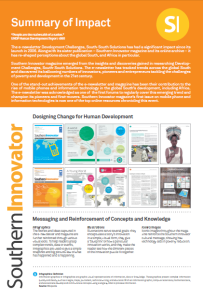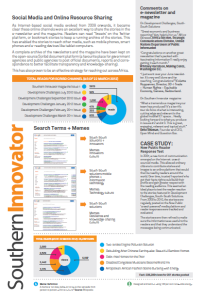Southern Innovator was initially launched in 2011 with the goal of - hopefully - inspiring others (just as we had been so inspired by the innovators we contacted and met). The magazine seeks to profile stories, trends, ideas, innovations and innovators overlooked by other media. The magazine grew from the monthly e-newsletter Development Challenges, South-South Solutions published by the United Nations Office for South-South Cooperation (UNOSSC) since 2006. A selection of books and papers citing stories from the magazine are featured below to aid researchers, in particular those interested in health and human development and the role of innovators in international development.
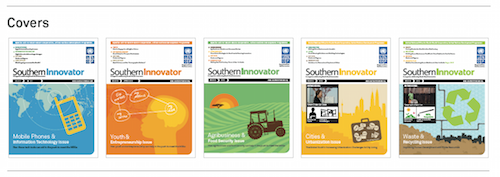 The first five issues of Southern Innovator from 2011 to 2014. Called a "Beautiful, inspiring magazine from UNDP on South-South innovation."
The first five issues of Southern Innovator from 2011 to 2014. Called a "Beautiful, inspiring magazine from UNDP on South-South innovation."
Books
Innovation Africa: Emerging Hubs of Excellence edited by Olugbenga Adesida, Geci Karuri-Sebina and João Resende-Santos (Emerald Group Publishing: 2016)
"Innovation is critical to growth and development in Africa. In the context of a continent characterized by fast growing economies as well as an array of socioeconomic challenges, such as high levels of poverty and inequality, innovation in Africa must be understood in an encompassing manner. Africa needs to support the emergence of its own Silicon Valleys, but it must also foster the invention and adoption of cleaner technologies that limit respiratory illnesses, deforestation and combat climate change. This book contains a number of analytical case studies that examine the nature and origins of emerging high-end innovation hubs in Africa. These "hubs" or ecosystems are both understudied and little known inside and outside the continent. With this analysis, the book highlights and draws lessons from some of the most promising and successful innovation cases in Africa today, exploring the key factors driving their successful emergence, growth and future prospects. Relevant for scholars, policymakers, and business leaders, the book provides both inspiration and useful policy advice that can inform strategies and concrete measures to speed up the pace of innovation in Africa today."
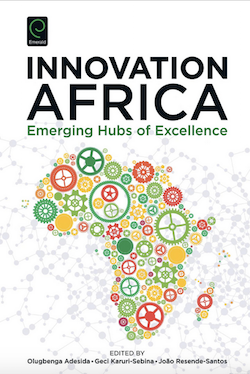 Innovation Africa: Emerging Hubs of ExcellenceBeyond Gated Communities edited by Samer Bagaeen and Ola Uduku (Routledge: 2015)
Innovation Africa: Emerging Hubs of ExcellenceBeyond Gated Communities edited by Samer Bagaeen and Ola Uduku (Routledge: 2015)
"Research on gated communities is moving away from the hard concept of a 'gated community' to the more fluid one of urban gating. The latter allows communities to be viewed through a new lens of soft boundaries, modern communication and networks of influence.
The book, written by an international team of experts, builds on the research of Bagaeen and Uduku’s previous edited publication, Gated Communities (Routledge 2010) and relates recent events to trends in urban research, showing how the discussion has moved from privatised to newly collectivised spaces, which have been the focal point for events such as the Occupy London movement and the Arab Spring.
Communities are now more mobilised and connected than ever, and Beyond Gated Communities shows how neighbourhoods can become part of a global network beyond their own gates. With chapters on Australia, Canada, Europe, South America, Asia, Africa and the Middle East, this is a truly international resource for scholars and students of urban studies interested in this dynamic, growing area of research."
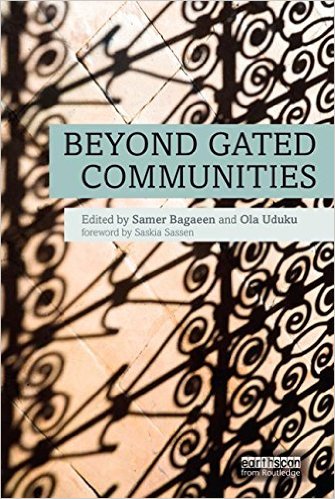 Beyond Gated Communities
Beyond Gated Communities
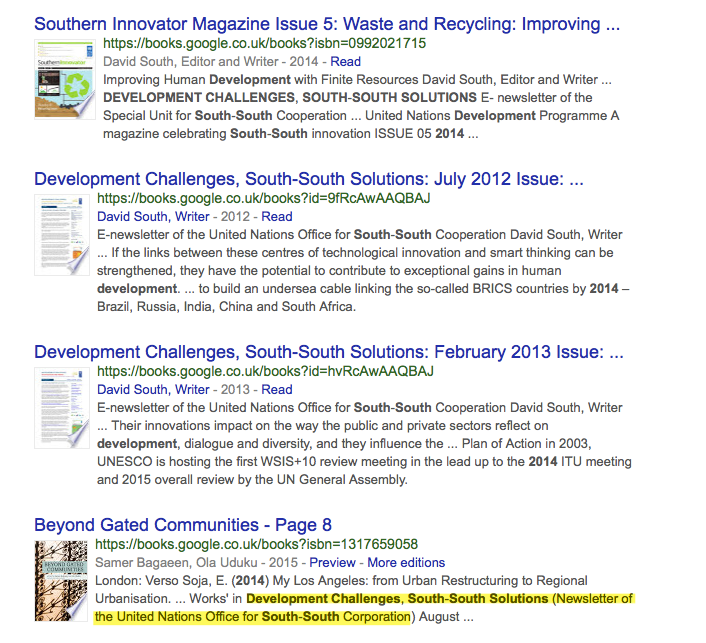 E-newsletter Development Challenges, South-South Solutions (UNOSSC) cited in Beyond Gated Communities (2015).
E-newsletter Development Challenges, South-South Solutions (UNOSSC) cited in Beyond Gated Communities (2015).
Chile in Transition: Prospects and Challenges for Latin America's Forerunner of Development by Roland Benedikter and Katja Siepmann (Springer: 2015)
"The economic, political and social situation in Chile shows a country in transition. Some observers anticipate a broad “reboot” of the nation. While Chile is still seen by many as an example of progress in South America and of developmental potential in the global South, it faces a complex political constellation, particularly in the aftermath of the re-election of Michelle Bachelet. Many wonder how social and institutional innovations can be incepted without interrupting the country’s remarkable success over the past decades.
This book provides an interdisciplinary analysis of Chile’s situation and perspectives. In particular, it addresses the questions:
- What is Chile’s real socio-political situation behind the curtains, irrespective of simplifications?
- What are the nation’s main opportunities and problems?
- What future strategies will be concretely applicable to improve social balance and mitigate ideological divisions?
The result is a provocative examination of a nation in search of identity and its role on the global stage.
Roland Benedikter, Dr., is Research Scholar at the Orfalea Center for Global and International Studies, University of California, Santa Barbara, Senior Research Scholar of the Council on Hemispheric Affairs Washington D.C., Trustee of the Toynbee Prize Foundation Boston and Full Member of the Club of Rome.
Katja Siepmann, MA, is Senior Research Fellow of the Council on Hemispheric Affairs Washington D.C., Member of the German Council on Foreign Relations, and Lecturer at the Faculty of Interdisciplinary Cultural Sciences of the European University Frankfurt/Oder.
The volume features a Foreword by Ned Strong, Executive Director of the David Rockefeller Center for Latin American Studies, Harvard University, and a Preface by Larry Birns, Director of the Council on Hemispheric Affairs, Washington D.C., and Former Senior Public Affairs Officer of the United Nations’ Economic Commission for Latin America (Santiago, Chile)."
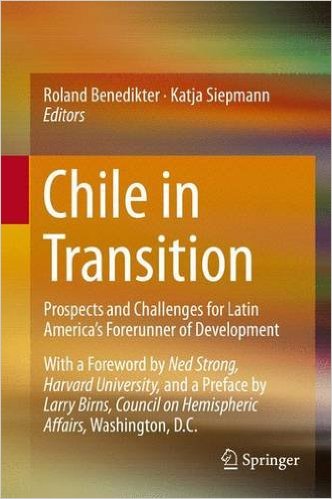 Chile in Transition: Prospects and Challenges for Latin America's Forerunner of Development
Chile in Transition: Prospects and Challenges for Latin America's Forerunner of Development
A Sociological Approach to Health Determinants by Toni Schofield (Cambridge University Press: 2015)
"A Sociological Approach to Health Determinants investigates how the social works in determining health and health inequity. Taking a global perspective, the book shines a light on how experiences of health, illness and health care are shaped by a variety of complex social dynamics. Informed primarily by sociology, the book engages with the WHO's social determinants of health approach and draws on contributions from history, political economy and policy analysis to examine issues such as class, gender, ethnicity and indigeneity, and the impact they have on health. A Sociological Approach to Health Determinants is a comprehensive resource that provides a new perspective on the influence of social structures on health, and how our understanding of the social can ensure improved health outcomes for people all over the globe. Toni Schofield is Associate Professor at the University of Sydney. She specialises in research and teaching in sociology, and public policy and administration."
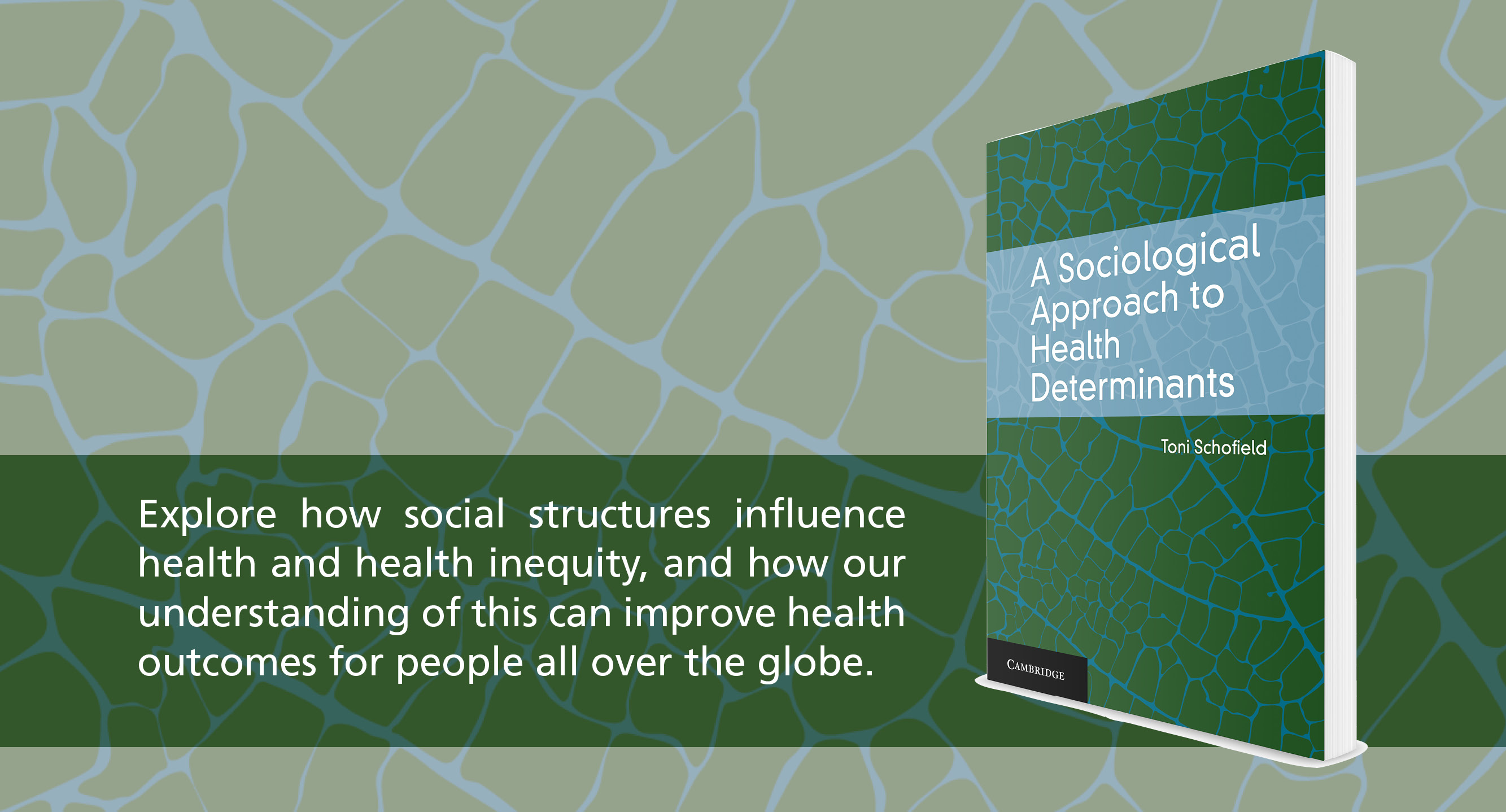 A Sociological Approach to Health Determinants
A Sociological Approach to Health Determinants
New Directions in Children's and Adolescents' Information Behavior Research edited by Dania Bilal and Jamshid Beheshti (Emerald Group Publishing: 2014)
"This book comprises innovative research on the information behavior of various age groups. It also looks at special populations such as ethnic minorities, indigenous peoples, and users with disabilities. The book presents research and reflections on designing systems that help the new generation cope with a complex knowledge society.
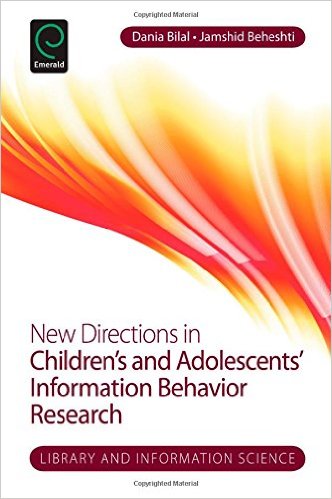 New Directions in Children's and Adolescents' Information Behavior Research
New Directions in Children's and Adolescents' Information Behavior Research
Papers and Reports
Afro-futurism and the aesthetics of hope in Bekolo's Les Saignantes and Kahiu's Pumzi by Mich Nyawalo, Journal of the African Literature Association, Volume 10, 2016, Issue 2
Autonomous Systems in the Intelligence Community: Many Possibilities and Challenges by Jenny R. Holzer, PhD, and Franklin L. Moses, PhD, Studies in Intelligence Vol 59, No. 1 (Extracts, March 2015)

Decoding the Brand DNA: A Design Methodology Applied to Favela Fashion by Magali Olhats, Universidade Federal de Santa Catarina Florianopolis, 2012
Economy Reports for APEC Economies on demographics, policies & ICT applications for people with Special Needs (Seniors and People with Disabilities), Asia-Pacific Economic Cooperation, APEC Telecommunications and Information Working Group, January 2013
Edible Insects and the Future of Food: A Foresight Scenario Exercise on Entomophagy and Global Food Security by Dominic Glover and Alexandra Sexton, Institute of Development Studies, King’s College London, Evidence Report No 149, September 2015
Evaluation of Kenyan Film Industry: Historical Perspective by Edwin Ngure Nyutho, School of Journalism and Mass Communication, University of Nairobi, 2015
Evaluation of the Regional Programme for Africa (2008-2013), UNDP Independent Evaluation Office, 2013

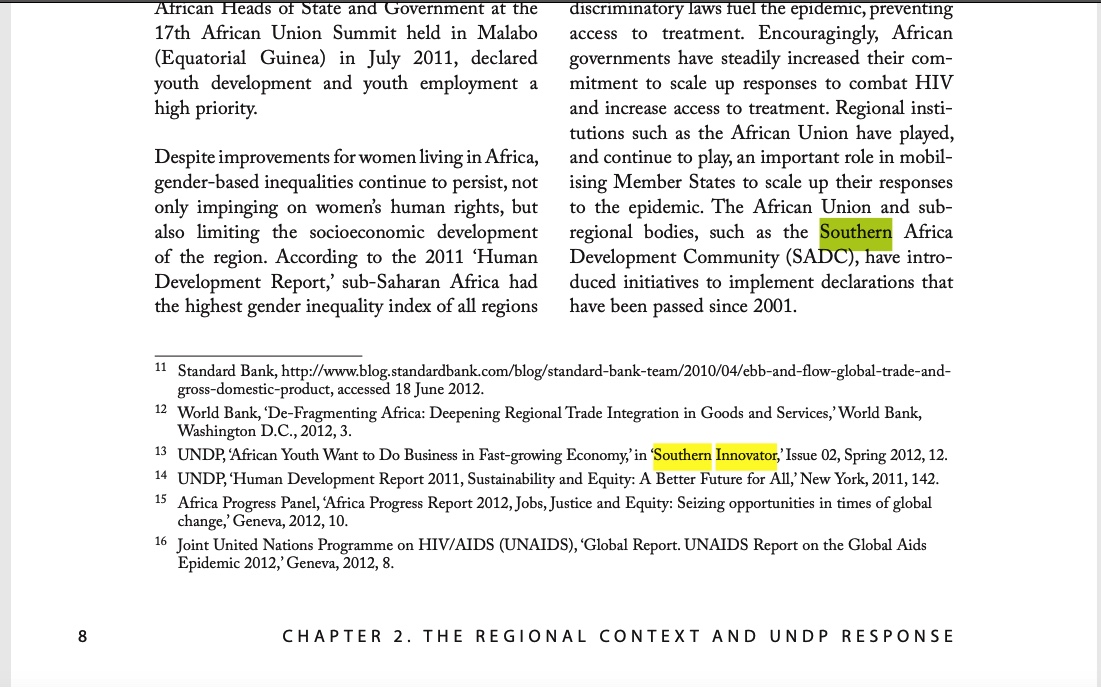
Evaluation of UNDP Contribution to South-South and Triangular Cooperation (2008-2011), Evaluation Office, UNDP 2013
Financing Renewable Energy in Developing Countries: Analysis of Business Models and Best Practices, Resources Future Publication, Pakistan Office, July 2018
Gastrodiplomacy: foreign experience and potential of the republic of Uzbekistan by M. Abduazimov, International Relations: Politics, Economics, Law, 2017
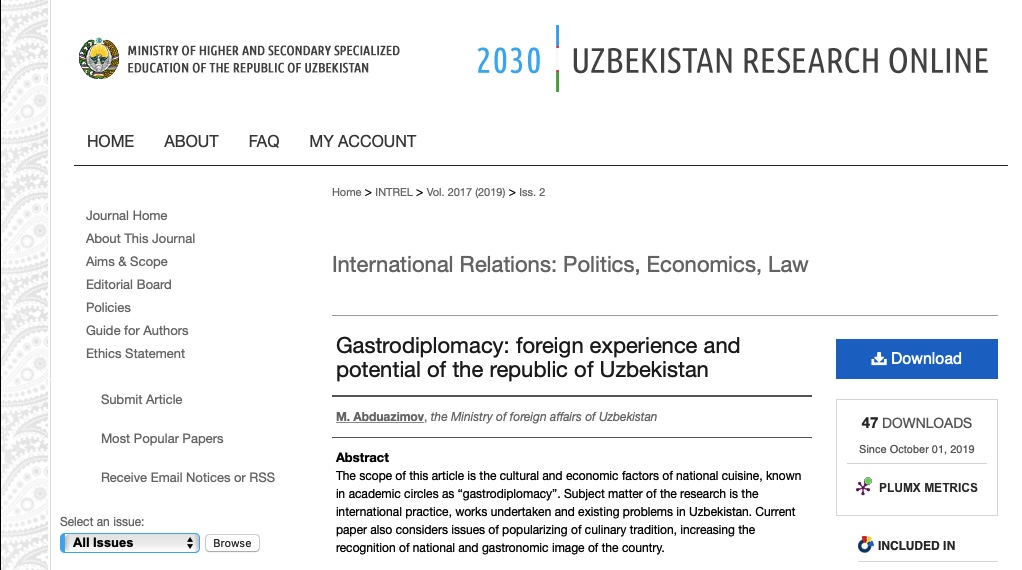

High-level Committee on South-South Cooperation Seventeenth Session: Framework of operational guidelines on United Nations support to South-South and triangular cooperation: Note by the Secretary-General, 22-25 May 2012, New York
Milk Production Potential and Major Browse Species Consumed by Dromedary Camels in Tshabong by Katsane Kgaudi, Eyassu Seifu and Demel Teketay, A Special Issue on Botswana Notes and Records' Golden Jubilee Volume in Honour of Sir Ketumile Masire, Volume 50, 2018
Mobilising Finance for Infrastructure: A Study for the UK Department for International Development (DFID), Cambridge Economic Policy Associates Ltd., August 2015
Modelo de Negocio para la Visibilizacion de Atributos Culturales Y Ambientales de Sistemas de Produccion Indigena. Caso de Estudio: Municipio de Puerto Narino - Amazonas (Colombia) by Juan Sebastian Romero Berbeo, Universidad Piloto de Colombia, Facultad de Ciencias Ambientales Programa en Administracion y Gestion Ambiental, 2016
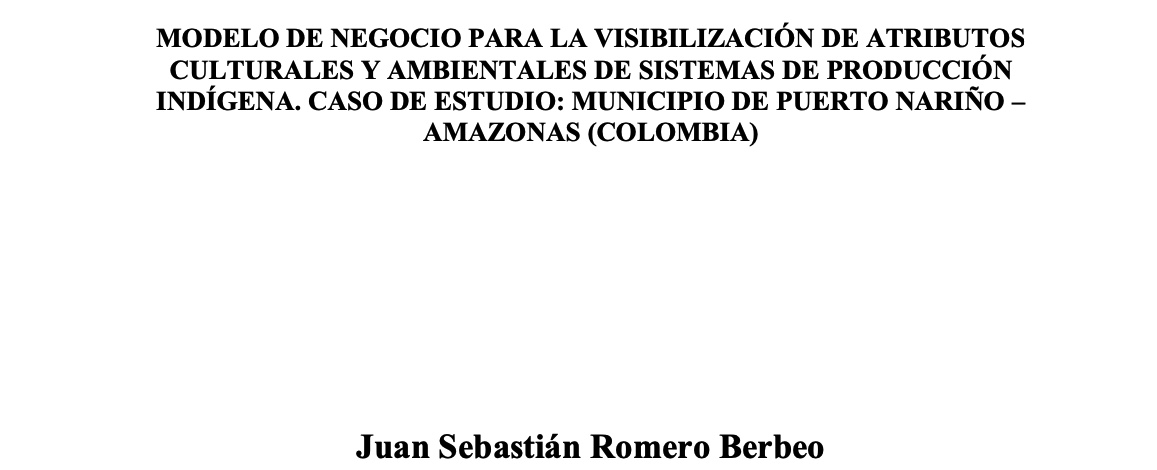
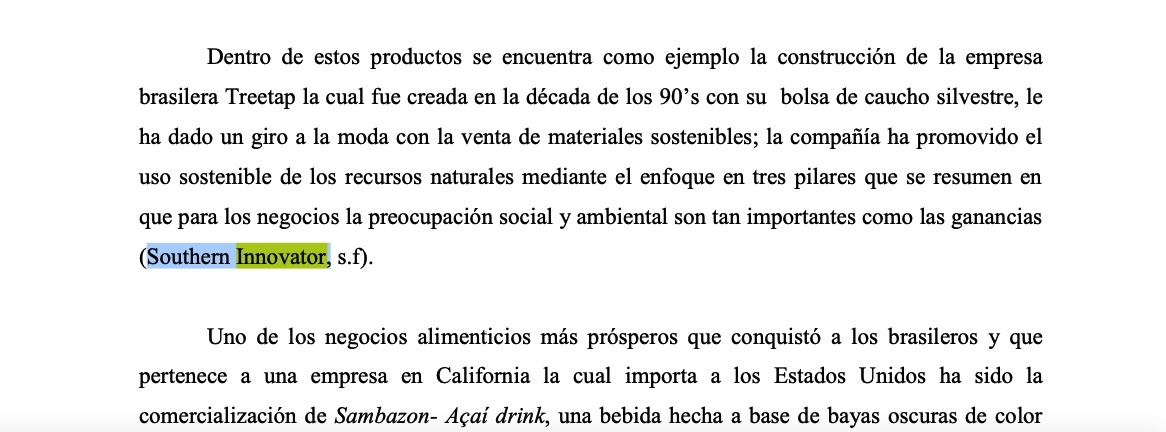
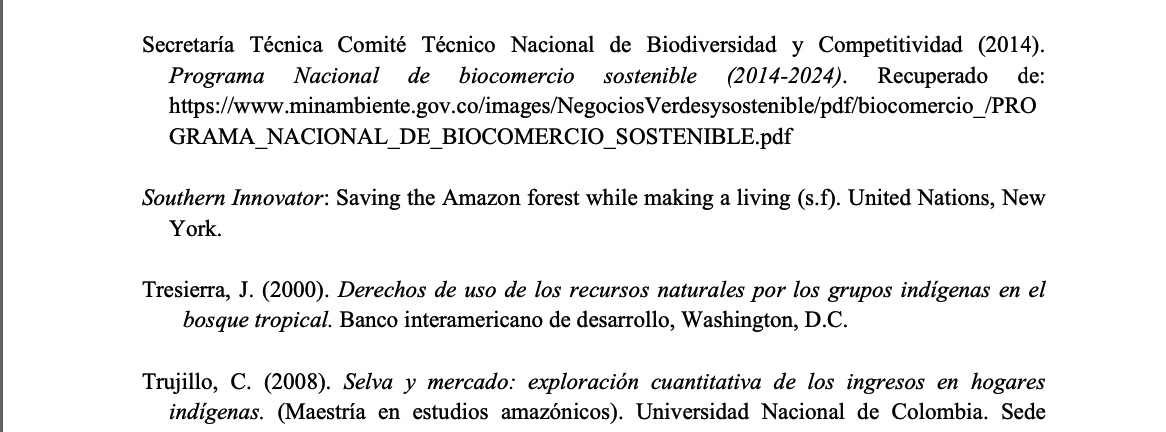
The New Middle Class and Urban Transformation in Africa: A Case Study of Accra, Ghana by Komiete Tetteh, The University of British Colombia, 2016
Propagating Gender Struggles Through Nollywood: Towards a Transformative Approach by Nita Byack George Iruobe, Geonita Initiative for Women and Child Development, 17 July 2015
Reberberation: Musicians and the Mobilization of Tradition in the Berber Culture Movement by TMG Wiedenkenner et al, The University of Arizona, 2013
Recasting 'truisms' of low carbon technology cooperation through innovation systems: insights from the developing world by Alexandra Mallett, Innovation and Development, 5:2, 297-311, DOI: 10.1080/2157930X.2015.1049851, Routledge Taylor & Francis Group, 2015
"Slam the Slums": Understanding architecture through the poor by Malini Foobalan, November 26th, 2009
Song Lines: Mapping the South African Live Performance Landscape: Report of the CSA 2013 Live Mapping Project Compiled by Concerts South Africa, Samro Foundation, 2013
Strategic Framework of the United Nations Office for South-South Cooperation, 2014-2017, Executive Board of the United Nations Development Programme, the United Nations Population Fund and the United Nations Office for Project Services, 27 to 31 January 2014, New York
Wearing Your Map on Your Sleeve: Practices of Identification in the Creation and Consumption of Philippine Map T-shirts by Pamela Gloria Cajilig, paper presented at the 6th Global Conference (2014): Fashion: Exploring Critical Issues, Mansfield College, Oxford, United Kingdom, 15th to 18th September 2014
Young Girls' Affective Responses to Access and Use of Information and Communication Technology (ICT) in Information-Poor Societies by Dania Bilal et al, New Directions in Children's and Adolescents' Information Behavior Research, Library and Information Science, Volume 10, Emerald Group Publishing Limited, 2014
Youth Empowered as Catalysts for Sustainable Human Development: UNDP Youth Strategy 2014-2017, United Nations Development Programme, Bureau for Development Policy
Southern Innovator can be read online here:
Scribd
Issue 1: http://www.scribd.com/doc/57980406/Southern-Innovator-Issue-1
Issue 2: http://www.scribd.com/doc/86451057/Southern-Innovator-Magazine-Issue-2
Issue 3: http://www.scribd.com/doc/106055665/Southern-Innovator-Magazine-Issue-3-Agribusiness-and-Food-Security
Issue 4: http://www.scribd.com/doc/128283953/Southern-Innovator-Magazine-Issue-4
Issue 5: http://www.scribd.com/doc/207579744/Southern-Innovator-Magazine-Issue-5-Waste-and-Recycling
Google Books
Issue 1: https://books.google.co.uk/books?id=Q1O54YSE2BgC&dq=southern+innovator&source=gbs_navlinks_s
Issue 2: https://books.google.co.uk/books?id=Ty0N969dcssC&dq=southern+innovator&source=gbs_navlinks_s
Issue 3: https://books.google.co.uk/books?id=AQNt4YmhZagC&dq=southern+innovator&source=gbs_navlinks_s
Issue 4: https://books.google.co.uk/books?id=9T_n2tA7l4EC&dq=southern+innovator&source=gbs_navlinks_s
Issue 5: https://books.google.co.uk/books?id=6ILdAgAAQBAJ&dq=southern+innovator&source=gbs_navlinks_s
And on Canada's PressReader news platform:
Issue 5: http://www.pressreader.com/usa/southern-innovator
Issue 4: http://www.pressreader.com/usa/southern-innovator/20130919
Issue 3: http://www.pressreader.com/usa/southern-innovator/20120912
Issue 2: http://www.pressreader.com/usa/southern-innovator/20120505
Southern Innovator is held in the following library collections:
Biblioteca Nationala a Republicii Moldova: http://cc.sibimol.bnrm.md/opac/bibliographic_view/399949;jsessionid=C516885A73E277718AE64598E869BC70
British Library: http://tinyurl.com/jfudl3z
Centre multimédia sur l'environnement et le développement Dakar, Senegal: http://www.enda-sigie.org/bases/sigie/format_liste.php?lang=fr&onglet=1&link=O&format=court&sort=Date%20DESC&Chp4=CONCEPTION+DE+BATIMENT
Library of Congress: http://catalog.loc.gov/vwebv/holdingsInfo?searchId=15784&recCount=25&recPointer=0&bibId=17462965
Malaysian Academic Library Union: http://malcat.uum.edu.my/kip/Record/ukm.vtls003513851
Princeton University Library: https://catalog.princeton.edu/catalog/9892864
Toronto Public Library: http://vc4kb8yf3q.search.serialssolutions.com/?V=1.0&N=100&L=VC4KB8YF3Q&S=AC_T_B&C=southern+innovator
Uganda Martyrs University: http://library.umu.ac.ug:81/cgi-bin/koha/opac-MARCdetail.pl?biblionumber=33335
United Nations Library Geneva: Issues 2, 4, 5: Click 'Get It': http://pmt-eu.hosted.exlibrisgroup.com/primo_library/libweb/action/search.do?SFGlobal=southern+innovator&submitGlobal=Go&fn=search&ct=search&initialSearch=true&mode=Basic&tab=default_tab&indx=1&dum=true&srt=rank&vid=41UNOG_V1&frbg=&vl%28freeText0%29=southern+innovator
Issue 1: http://pmt-eu.hosted.exlibrisgroup.com/primo_library/libweb/action/display.do?tabs=detailsTab&ct=display&fn=search&doc=41UNOG_Alma21105606680002391&indx=1&recIds=41UNOG_Alma21105606680002391&recIdxs=0&elementId=0&renderMode=poppedOut&displayMode=full&frbrVersion=&dscnt=0&frbg=&tab=default_tab&dstmp=1424959330694&srt=rank&mode=Basic&&dum=true&SFGlobal=southern+innovator&vl%28freeText0%29=southern%20innovator&vid=41UNOG_V1&submitGlobal=Go
Universiti Teknologi Malaysia Libraries: http://ent.library.utm.my/client/en_AU/main/search/detailnonmodal/ent:$002f$002fSD_ILS$002f820$002fSD_ILS:820407/ada?qu=Youth&rw=1200&ic=true&ps=300
University of Cape Town Libraries: http://aleph20.calico.ac.za/F/?local_base=uct01pub&func=find-b&find_code=OCLC&request=%28ocolc%29870179464
University of Saskatchewan: http://sundog.usask.ca/search/t?SEARCH=southern+innovator&sortdropdown=-&searchscope=8
If you would like hard copies of the magazine for distribution, then please contact the United Nations Office for South-South Cooperation: Website: http://ssc.undp.org/content/ssc.html. If you would like to either sponsor an issue of Southern Innovator or place an advertisement in the magazine, then please contact southerninnovator@yahoo.co.uk.



We accept payments and donations. We use any funds received to keep content online, or to create new content. Thank you! https://www.paypal.me/davidsouthconsulting.
 Scan code with your phone and help us out.ORCID iD: https://orcid.org/0000-0001-5311-1052.
Scan code with your phone and help us out.ORCID iD: https://orcid.org/0000-0001-5311-1052.
© David South Consulting 2021
 Tuesday, December 8, 2020 at 4:31PM
Tuesday, December 8, 2020 at 4:31PM 
 200 million children,
200 million children,  Africa,
Africa,  Institute of Child Health,
Institute of Child Health,  MDGs,
MDGs,  The Lancet,
The Lancet,  child health,
child health,  development,
development,  education,
education,  literacy,
literacy,  primary education,
primary education,  toys in
toys in  21st century,
21st century,  Agenda 2030,
Agenda 2030,  Agenda 21,
Agenda 21,  Children,
Children,  Children First,
Children First,  David South Consulting,
David South Consulting,  David South International,
David South International,  Global South,
Global South,  Human Development Innovator,
Human Development Innovator,  Institute of Child Health,
Institute of Child Health,  Millennium Development Goals,
Millennium Development Goals,  South-South News,
South-South News,  Youth
Youth 















